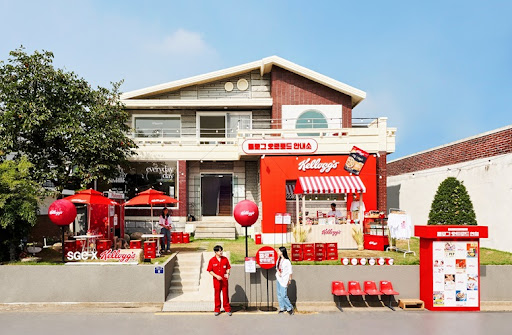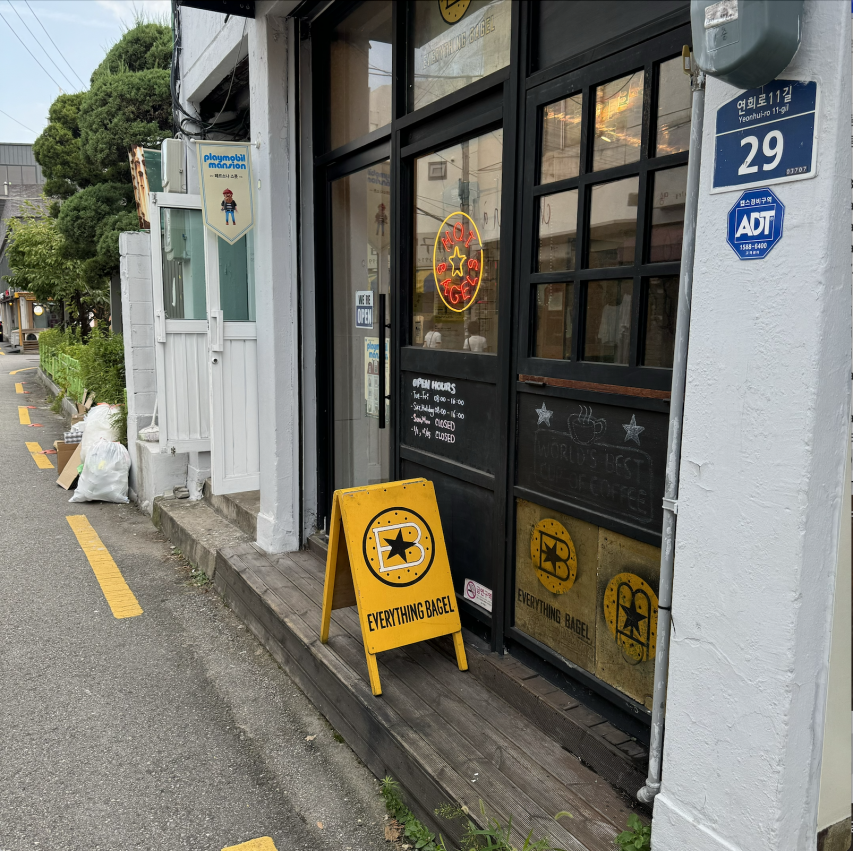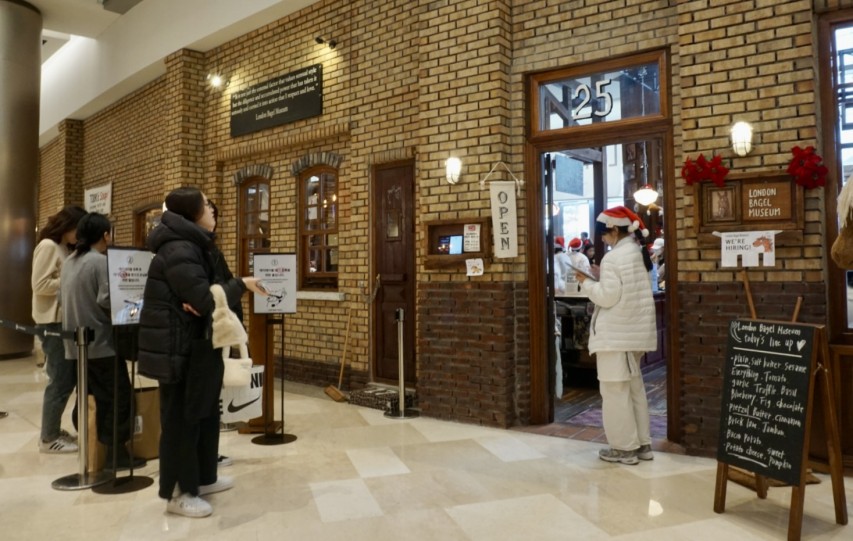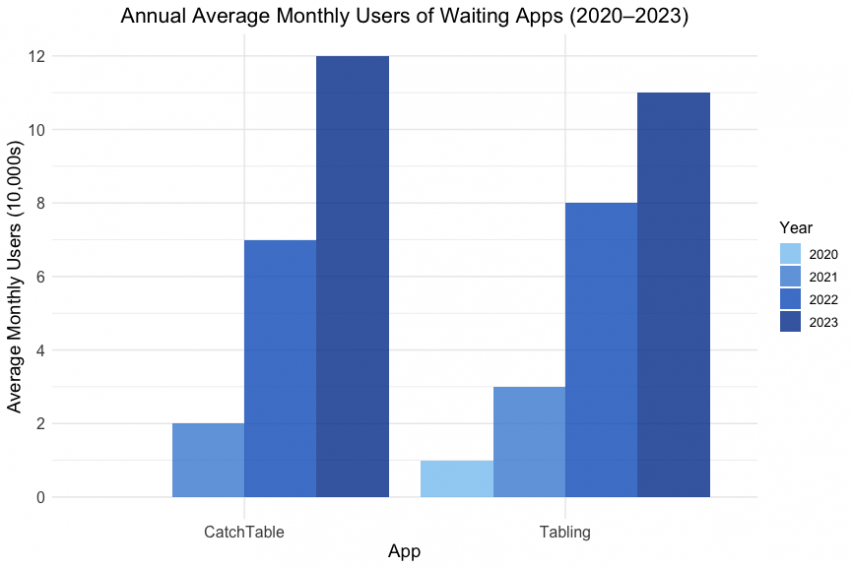On August 28, 2024, over 57 groups were waiting to enter the London Bagel Museum in Jamsil-dong, with the worker estimating a wait time of about two and a half hours. Yet, only a few customers were queuing outside the store. This is due to the growing use of online reservation applications (ORAs), which eliminates the need to physically wait in line. As these applications (apps) gained popularity, a new trend emerged—“0th culture,” where consumers engage in other activities while virtually waiting, reshaping consumer behavior.
In front of the Londen Bagel Museum Jamsil branch
Proliferation of ORAs
ORAs provide significant convenience to users through their various functions. In Korea, the most popular ORAs are Catch Table and Tabling, which allow users to order from the menu, make reservations, and receive notifications about wait times, eliminating the need to wait in front of stores.
The usage of ORAs has quickly expanded. Catch Table, launched in 2021, was used by over 7,000 stores by May 2023. In terms of consumers, 1.41 million users accessed the app in December 2023, with that number rising to three million when including website users.Market analysis by Sometrend revealed that mentions of keywords related to waiting and apps have increased significantly over the past three years. This steady growth indicates that this new form of waiting is becoming a trend in the business sector.
Increase in user from 2020 to 2023 | Photo: Wiseapp (wiseapp.co.kr) |
Widespread ORAs Caused New Consuming Behavior, 0th Culture
The rise of ORAs has significantly reduced the need for people to physically wait in front of stores. As a result, people make better use of their time, engaging in other activities during the waiting time. A 2023 survey by Embrain of 500 respondents revealed that the most common reason for using time-saving services like ORAs was to minimize wasted time and make the most out of waiting periods.
Park Hae-oreum, a student from the Dept. of Musical Broadcasting and Acting at Kunsan National University, shared his experience. “I usually use Catch Table to make reservations while traveling because I want to have as diverse experiences as possible,” he said. He added, “I often try to visit as many places as I can in a limited time. During the waiting period, I typically go to the coffee shop, do some work, or explore my surroundings.” This shift in behavior is giving rise to what is now called 0th culture—the practice of having a productive experience before the first schedule.
This behavior is driven by socio-psychological changes, prompting people to make more efficient decisions. Kim Nan-do, author of Trend Korea 2024, explained in the book that shifts in economic paradigms, the abundance of data, advancements in technology, and changing perceptions of face-to-face interactions due to the pandemic are leading people to prioritize quality over quantity. This inclination aligns with the use of ORAs, which allows consumers to spend time more efficiently.
Utilizing 0th Culture
The primary economic impact of the 0th culture is the spillover effect, which refers to activities in one area that affect one another. This occurs when people utilize their spare time to explore the surrounding area, thereby stimulating local commercial activity. Some companies have leveraged this effect to achieve dual benefits: mitigating overcrowding and retaining their customers.
Kellogg Korea’s pop-up store event, Oat Road, held in Yeonhui-dong from September 30 to October 21, 2022, is a prime example. Kellogg collaborated with seven local businesses, including Everything Bagel, Cold Recipe, and Coffee Shop Dongkyong, among others. The event attracted approximately 17,000 visitors. This collaboration not only benefited Kellogg and its partners but also boosted the entire area’s commercial activity.

|
The Kellogg promotion at Yeonhui-dong | Photo: Wiseapp (wiseapp.co.kr) |
Yoo Jin-gwang, the manager of Everything Bagel, noted, “After the Kellogg pop-up store event, LG U Plus and Play Mobil tried a similar event in Yeonhui-dong. When those companies introduced their plan, they had the same logic to resolve the overcrowding problem, collaborating with local businesses as Kellogg did.” Although such projects might appear to benefit only the company and its partners, it has a positive effect on the entire commercial area. Yoo added, “When Kellogg entered Yeonhui-dong, the whole area became crowded. Although the company only cooperated with seven local businesses, other non-partner businesses also benefited from the increased number of visitors during that period.”
 |
Entrance of Everything Bagel |
|
|
The increasing usage of ORAs enables people to manage their waiting time more effectively. Combined with broader socio-psychological changes, this has given rise to a new form of consumer behavior—0th culture. Companies have leveraged this trend to create various positive effects for themselves, their partners, and the local commercial areas. As 0th culture continues to evolve, it will be worth investigating how this new consumer behavior impacts the business landscape.





